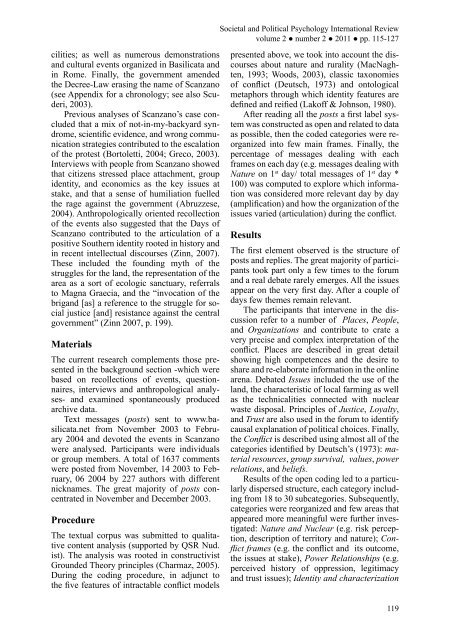State, community, individual - Societal and Political Psychology ...
State, community, individual - Societal and Political Psychology ...
State, community, individual - Societal and Political Psychology ...
You also want an ePaper? Increase the reach of your titles
YUMPU automatically turns print PDFs into web optimized ePapers that Google loves.
cilities; as well as numerous demonstrations<br />
<strong>and</strong> cultural events organized in Basilicata <strong>and</strong><br />
in Rome. Finally, the government amended<br />
the Decree-Law erasing the name of Scanzano<br />
(see Appendix for a chronology; see also Scuderi,<br />
2003).<br />
Previous analyses of Scanzano’s case concluded<br />
that a mix of not-in-my-backyard syndrome,<br />
scientifi c evidence, <strong>and</strong> wrong communication<br />
strategies contributed to the escalation<br />
of the protest (Bortoletti, 2004; Greco, 2003).<br />
Interviews with people from Scanzano showed<br />
that citizens stressed place attachment, group<br />
identity, <strong>and</strong> economics as the key issues at<br />
stake, <strong>and</strong> that a sense of humiliation fuelled<br />
the rage against the government (Abruzzese,<br />
2004). Anthropologically oriented recollection<br />
of the events also suggested that the Days of<br />
Scanzano contributed to the articulation of a<br />
positive Southern identity rooted in history <strong>and</strong><br />
in recent intellectual discourses (Zinn, 2007).<br />
These included the founding myth of the<br />
struggles for the l<strong>and</strong>, the representation of the<br />
area as a sort of ecologic sanctuary, referrals<br />
to Magna Graecia, <strong>and</strong> the “invocation of the<br />
brig<strong>and</strong> [as] a reference to the struggle for social<br />
justice [<strong>and</strong>] resistance against the central<br />
government” (Zinn 2007, p. 199).<br />
Materials<br />
The current research complements those presented<br />
in the background section -which were<br />
based on recollections of events, questionnaires,<br />
interviews <strong>and</strong> anthropological analyses-<br />
<strong>and</strong> examined spontaneously produced<br />
archive data.<br />
Text messages (posts) sent to www.basilicata.net<br />
from November 2003 to February<br />
2004 <strong>and</strong> devoted the events in Scanzano<br />
were analysed. Participants were <strong>individual</strong>s<br />
or group members. A total of 1637 comments<br />
were posted from November, 14 2003 to February,<br />
06 2004 by 227 authors with different<br />
nicknames. The great majority of posts concentrated<br />
in November <strong>and</strong> December 2003.<br />
Procedure<br />
The textual corpus was submitted to qualitative<br />
content analysis (supported by QSR Nud.<br />
ist). The analysis was rooted in constructivist<br />
Grounded Theory principles (Charmaz, 2005).<br />
During the coding procedure, in adjunct to<br />
the fi ve features of intractable confl ict models<br />
<strong>Societal</strong> <strong>and</strong> <strong>Political</strong> <strong>Psychology</strong> International Review<br />
volume 2 ● number 2 ● 2011 ● pp. 115-127<br />
presented above, we took into account the discourses<br />
about nature <strong>and</strong> rurality (MacNaghten,<br />
1993; Woods, 2003), classic taxonomies<br />
of confl ict (Deutsch, 1973) <strong>and</strong> ontological<br />
metaphors through which identity features are<br />
defi ned <strong>and</strong> reifi ed (Lakoff & Johnson, 1980).<br />
After reading all the posts a fi rst label system<br />
was constructed as open <strong>and</strong> related to data<br />
as possible, then the coded categories were reorganized<br />
into few main frames. Finally, the<br />
percentage of messages dealing with each<br />
frames on each day (e.g. messages dealing with<br />
Nature on 1 st day/ total messages of 1 st day *<br />
100) was computed to explore which information<br />
was considered more relevant day by day<br />
(amplifi cation) <strong>and</strong> how the organization of the<br />
issues varied (articulation) during the confl ict.<br />
Results<br />
The fi rst element observed is the structure of<br />
posts <strong>and</strong> replies. The great majority of participants<br />
took part only a few times to the forum<br />
<strong>and</strong> a real debate rarely emerges. All the issues<br />
appear on the very fi rst day. After a couple of<br />
days few themes remain relevant.<br />
The participants that intervene in the discussion<br />
refer to a number of Places, People,<br />
<strong>and</strong> Organizations <strong>and</strong> contribute to crate a<br />
very precise <strong>and</strong> complex interpretation of the<br />
confl ict. Places are described in great detail<br />
showing high competences <strong>and</strong> the desire to<br />
share <strong>and</strong> re-elaborate information in the online<br />
arena. Debated Issues included the use of the<br />
l<strong>and</strong>, the characteristic of local farming as well<br />
as the technicalities connected with nuclear<br />
waste disposal. Principles of Justice, Loyalty,<br />
<strong>and</strong> Trust are also used in the forum to identify<br />
causal explanation of political choices. Finally,<br />
the Confl ict is described using almost all of the<br />
categories identifi ed by Deutsch’s (1973): material<br />
resources, group survival, values, power<br />
relations, <strong>and</strong> beliefs.<br />
Results of the open coding led to a particularly<br />
dispersed structure, each category including<br />
from 18 to 30 subcategories. Subsequently,<br />
categories were reorganized <strong>and</strong> few areas that<br />
appeared more meaningful were further investigated:<br />
Nature <strong>and</strong> Nuclear (e.g. risk perception,<br />
description of territory <strong>and</strong> nature); Confl<br />
ict frames (e.g. the confl ict <strong>and</strong> its outcome,<br />
the issues at stake), Power Relationships (e.g.<br />
perceived history of oppression, legitimacy<br />
<strong>and</strong> trust issues); Identity <strong>and</strong> characterization<br />
119


